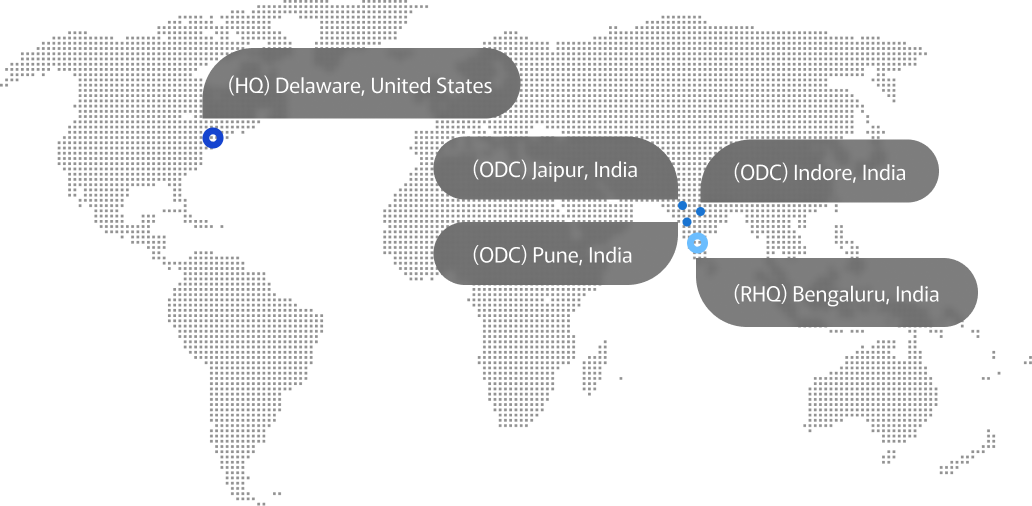
- iOS App Development
Top 5 iOS App Development Frameworks to Accelerate your Projects
The study suggests that the average screen time of an individual has increased by 80% compared to what it was 7-8 years ago. With almost everything available on the black mirror today, it’s next to impossible to imagine a world without the internet. And while the internet is the most used commodity globally right now, so is the demand for apps—not just any app but a user-friendly one. With people using at least three applications a day, today’s population has a higher chance to reject or use an app depending on its user-friendliness.
So, if you dream of creating an app that is an instant hit among the audience, you first need to understand which development framework you require the most! We, at Advayan, will unveil the ultimate guide to supercharge your iOS app development projects. In our blog, “Top 5 iOS App Development Frameworks to Accelerate Your Projects,” we delve into the dynamic landscape of iOS development, presenting a curated selection of frameworks poised to revolutionize your workflows. Whether you’re a seasoned developer or just starting, our insights will empower you to choose the right tools for enhanced functionality, speed, and scalability.
Discover the latest advancements in iOS app development as we explore frameworks like SwiftUI, Swiftic, and React Native. Each framework is meticulously selected to align with Advayan’s commitment to cutting-edge technology and seamless development experiences. Join us on this immersive exploration, where expertise meets innovation, and accelerate your iOS projects with confidence.
Table Of Content
What is the Framework for iOS?
Now that we’re intrigued to learn more about the app development framework, let’s focus on iOS. Your Apple devices run apps smoothly, and we ensure their functionality with the perfect iOS app functioning.
To discover and excel better in iOS app development, let’s first understand the framework of iOS. For iOS app development, a framework serves as the backbone, providing developers with a structured foundation and a set of tools to streamline the creation of applications. A framework for iOS encompasses a collection of pre-written code, libraries, and guidelines designed to expedite and standardize the development process.
These frameworks not only simplify coding tasks but also enhance the functionality, scalability, and overall efficiency of iOS app development.
In the curated selection of top frameworks, such as SwiftUI, Swiftic, and React Native, it’s essential to recognize that each framework brings its unique set of advantages. SwiftUI, introduced by Apple in 2019, revolutionizes UI development, while Swiftic offers a navigable interface for swift app creation. React Native, a cross-platform framework stands out for its versatility.
For iOS, acting as a catalyst propels developers to create robust, feature-rich applications with speed and precision.
What is a Framework?
In Software development, a framework is a structured and pre-built foundation that facilitates the creation of applications by providing a set of pre-defined tools, libraries, and conventions. Essentially, it serves as a scaffolding that developers can leverage to streamline and expedite the development process.
A framework typically includes essential components like libraries, APIs, and reusable code snippets, allowing developers to focus on building specific features rather than reinventing the wheel. It sets the structure for the application, enforces coding standards, and often follows the paradigm of the programming language it supports.
For iOS app development, frameworks play a pivotal role in enhancing productivity and ensuring consistency across projects. They encapsulate best practices, enable code reusability, and contribute to the overall efficiency of the development workflow.
Top 7 iOS Frameworks
iOS app development continues to evolve, and choosing the right framework is crucial for project acceleration. In this comprehensive exploration, we dive into the top seven iOS frameworks, each handpicked to align with Advayan’s commitment to cutting-edge technology and seamless development experiences.
1. SwiftUI
SwiftUI, introduced by Apple in 2019, is a revolutionary framework that simplifies UI development with a declarative syntax. Its live preview feature allows real-time adjustments, enhancing the developer’s workflow. SwiftUI’s robust integration with other Apple technologies makes it a go-to choice for building modern and responsive iOS applications.
2. React Native
Powered by Facebook, React Native stands out for its cross-platform capabilities. Developers can use a single codebase to create both iOS and Android applications, saving time and resources. React Native’s extensive library of pre-built components accelerates development, making it a preferred choice for those seeking efficiency and flexibility.
3. Flutter
Flutter, backed by Google, is known for its beautiful and natively compiled applications. With a hot-reload feature, developers can see real-time changes, streamlining the debugging process. Flutter’s customizable widgets and expressive UI contribute to a visually stunning user experience, making it a top contender for Advayan’s iOS projects.
4. Kotlin Multiplatform Mobile (KMM)
KMM, endorsed by JetBrains, facilitates code sharing between iOS and Android platforms. Developers can write business logic once and reuse it across both ecosystems, promoting code consistency and reducing development time. KMM seamlessly integrates with existing iOS projects, offering a smooth transition to Kotlin-based development.
5. Ionic
Ionic is a popular open-source framework for building cross-platform mobile applications using web technologies like HTML, CSS, and JavaScript. It provides a library of pre-built UI components and simplifies the development process. With Advayan’s commitment to efficiency, Ionic offers a robust solution for rapid app development.
6. Xamarin
Microsoft’s Xamarin allows developers to use C# for building native iOS applications. Its shared codebase across platforms ensures consistency, and Xamarin’s integration with Visual Studio streamlines the development workflow. Advayan can leverage Xamarin to achieve a seamless cross-platform experience.
7. Intel XDK
Intel XDK provides a comprehensive development environment for creating cross-platform mobile applications. With built-in templates and tools, developers can accelerate project development. Advayan can benefit from Intel XDK’s capabilities to create robust and feature-rich iOS applications.
Conclusion
To sum it all up, in this blog, the best iOS app frameworks – SwiftUI, Swiftic, React Native, and others – have been discussed as powerful allies in the pursuit of accelerated and seamless iOS app development.
Furthermore, our commitment at Advayan is to empower developers with the tools that meet today’s demands and pave the way for the future. The frameworks highlighted in this blog are more than just tools; they represent our dedication to excellence, efficiency, and staying at the forefront of technological advancements. Whether you are a seasoned developer or a newcomer, we hope this guide serves as a valuable resource in your quest for exceptional iOS app development.





